This article was co-authored by Tracy Carver, PhD. Dr. Tracy Carver is an award-winning Licensed Psychologist based in Austin, Texas. Dr. Carver specializes in counseling for issues related to self-esteem, anxiety, depression, and psychedelic integration. She holds a BS in Psychology from Virginia Commonwealth University, an MA in Educational Psychology, and a Ph.D. in Counseling Psychology from The University of Texas at Austin. Dr. Carver also completed an internship in Clinical Psychology through Harvard University Medical School. She was voted one of the Best Mental Health Professionals in Austin for four years in a row by Austin Fit Magazine. Dr. Carver has been featured in Austin Monthly, Austin Woman Magazine, Life in Travis Heights, and KVUE (the Austin affiliate for ABC News).
There are 8 references cited in this article, which can be found at the bottom of the page.
wikiHow marks an article as reader-approved once it receives enough positive feedback. In this case, several readers have written to tell us that this article was helpful to them, earning it our reader-approved status.
This article has been viewed 145,210 times.
Many people get nervous before a big presentation, business meeting, or an upcoming date. Nervousness can get the best of us and can be hard to avoid for some, but with some practice anyone can overcome it. Follow a few simple steps to overcome nervousness about a big event or in daily life.
Steps
Handling Nerve-Wracking Situations
-
1Practice whatever makes you nervous. If you are nervous about public speaking, flirting on dates, or doing a good job at work practice can make you more confident and alleviate nerves. The more experience you have, the more used to the situation you will feel—and that can go a long way toward alleviating your anxiety.[1]
- If you are nervous about dating, try getting a friend to go on a practice date with you. Go to the place where you plan to have your date and practice having conversations and doing the activities you will do on the date.
- If you are nervous about public speaking, seek out opportunities to practice talking in public. Volunteer to talk in your class at school when there are opportunities. Attend a public meeting and voice your opinion. Join a public speaking organization. The more you get a chance to practice, the less nervous you will be.
-
2Prepare in advance. Preparation for the specific task that makes you nervous will make you feel ready and self-assured.[2]
- If you're nervous about a big test, study as much as you can. That will help you feel confident instead of anxious.[3]
- For a job interview, do research on the company and the position so you can speak knowledgeably. Try to think of some potential questions that may come up and plan out your answers in advance.
- For a date, think about questions you can ask your date about themselves. If there are any lulls in conversation you can have an interesting question ready and not have to come up with things to say.
Advertisement -
3Think positively. Visualize yourself doing well and not being nervous. Walk through the event that makes you nervous in your head and imagine yourself calm and successful.
- Treat yourself with compassion. Remember your body is actually doing what it's supposed to do! Our brains are meant to think and respond to stressful scenarios, so try to view nervousness positively instead of trying to feel bad about being nervous.[4]
- For a date, imagine the date going well and that you both are relaxed and having a good time.
- For a big speech, visualize yourself in front of your audience. Think about yourself giving a relaxed and successful presentation. See your audience enjoying your speech.
- Things like deep breathing or repeating a mantra to yourself can help you put yourself in a more positive mindset.[5]
-
4Relax your body. Try to relax yourself ahead of time to reduce nervousness. Take a few minutes before situations that make you nervous and try to work out your nervous energy and get relaxed.
- Focus on small areas of tightness in your body (like your jaw or shoulders). Let that tension go.[6]
- Try sitting in a dark, quiet room to calm your mind.
- Progressively relax your body. Tighten and then relax each of your muscles. Start at the top of your body and work your way down. Tighten your shoulder muscles then relax them. Tighten your arm muscles then relax them, and so on.
- Go for a walk to get out some nervous energy and clear your mind.
-
5Concentrate on your breathing.[7] Try to think about your breathing and take slow, deep breaths.
- Thinking about breathing slowly not only calms you down physically, but can also distract you from your nervousness.
- Take ten deep breaths while thinking about the air moving in through your nose, filling your lungs, and moving out through your mouth. This might make you feel focused and calm.
-
6Reduce sweating from nervousness. Use some simple steps to avoid sweating too much when you are nervous.
- Wear cooler clothes.
- Use a strong antiperspirant.
- Avoid wearing hats.
-
7Reduce nervous movements. Even if you feel nervous try not to fidget around nervously.
- Stand still instead of shifting your weight from side to side.
- Hold your hands loosely at your sides instead of making nervous gestures.
- Hold a pen in your hand if it helps you remember not to fidget.
-
8Rationalize the situation. Often, your thoughts about an upcoming event will be much worse than what will actually happen. Ask yourself why you are nervous and whether your feelings are really founded. Think about what could really go wrong and consider that the worst outcome you imagine would not be so bad.
- Try to reframe your thoughts by asking yourself what is the worst that can happen. Picture that outcome, and ask yourself if you could survive should the scenario occur.
-
9Remember that nobody knows you're nervous. Others can not tell how nervous you are so don't worry about appearing too nervous. Often people feel much more nervous than they appear.
Handling General Nervousness
-
1Get more exercise. Getting regular aerobic exercise is an easy and effective way to overcome nervousness. Exercise reduces physical tension in muscles, produces relaxing neurotransmitters, and burns stress hormones. Even 20 minutes of aerobic exercise can help burn off extra cortisol and reduce your stress.[8]
- Try meditation or yoga.[9] These activities are based on relaxation and they are good sources of exercise.
- Take up a sport.
- Join a gym.
- Go out for walks or bicycle rides.
-
2Try journaling. Writing in a journal can help you overcome nervousness by making it easier to collect and confront nervous thoughts.[10] If you think about what makes you nervous and keep track of it in your journal, you'll have a better sense of when and why you get nervous.[11]
- Journaling can also help you work out nervous thoughts head of time on paper so that you are less nervous in your actions.
- Chronicling your nervous thoughts can help put them in perspective. Look back over things you were nervous about and think how well they turned out in the end.
-
3Practice mindfulness. The more you are able to focus on the present moment, the less your mind will concentrate on "what-if" situations. Practice mindfulness in everyday situations by focusing on what is directly around you and clearing your head of noise and invasive thoughts.[12]
-
4Drink less caffeine. Caffeine is known to make people feel nervous and jittery. Try to avoid drinks with caffeine, especially before an event you are nervous about or late at night.
- Instead of coffee and caffeinated teas, try drinking a calming herbal tea.
- Avoid sodas with caffeine.
- Energy drinks are very high in caffeine.
-
5Get more sleep. Loss of sleep can be a major trigger for nervousness, so making sure you are well rested is important.[13]
Seeking Help
-
1Seek help for more serious nervousness and anxiety. If your nervousness prevents you from doing things you want to do in your daily life you may need to seek help from a therapist or psychologist.[14]
-
2Talk to someone. Talk to a friend, parent, or mentor about your nervousness. Talking about what makes you nervous can help alleviate some of your anxiety. Your friend may share similar stories about nervousness and have some ideas on good ways to cope.
-
3Speak with a professional. A professional therapist or psychologist can help you overcome more problematic nervousness using medication or therapy.[15] Some solutions to discuss with a professional include:
- Medication to reduce stress or anxiety.
- Techniques to be more aware of stress or nervousness.
- Breathing techniques to reduce nervousness.
- Relaxation strategies to reduce bodily symptoms of nervousness.
- Techniques for how to think about your nervousness and confront it or distract yourself.
- Managing nervousness through slow exposure to anxiety inducing situations
- Problem-solving strategies for confronting nervousness.
- Methods for coping with setbacks.
Expert Q&A
Did you know you can get expert answers for this article?
Unlock expert answers by supporting wikiHow
-
QuestionHow can I calm my nerves before performing?
 Nicolette Tura, MANicolette Tura is an Authentic Living Expert who operated her own wellness business for more than ten years in the San Francisco Bay Area. Nicolette is a 500-hour Registered Yoga Teacher with a Psychology & Mindfulness Major, a National Academy of Sports Medicine (NASM) certified Corrective Exercise Specialist, and is an expert in authentic living. She holds a BA in Sociology from the University of California, Berkeley and got her master's degree in Sociology from SJSU. She constantly draws from her own wounds and challenges; with her training in the healing arts and sociology, she offers potent content, powerful meditations, and game-changing seminars on inspiring elevation on a personal and corporate level.
Nicolette Tura, MANicolette Tura is an Authentic Living Expert who operated her own wellness business for more than ten years in the San Francisco Bay Area. Nicolette is a 500-hour Registered Yoga Teacher with a Psychology & Mindfulness Major, a National Academy of Sports Medicine (NASM) certified Corrective Exercise Specialist, and is an expert in authentic living. She holds a BA in Sociology from the University of California, Berkeley and got her master's degree in Sociology from SJSU. She constantly draws from her own wounds and challenges; with her training in the healing arts and sociology, she offers potent content, powerful meditations, and game-changing seminars on inspiring elevation on a personal and corporate level.
Authentic Living Expert
-
QuestionWhy is journaling a good coping skill?
 Nicolette Tura, MANicolette Tura is an Authentic Living Expert who operated her own wellness business for more than ten years in the San Francisco Bay Area. Nicolette is a 500-hour Registered Yoga Teacher with a Psychology & Mindfulness Major, a National Academy of Sports Medicine (NASM) certified Corrective Exercise Specialist, and is an expert in authentic living. She holds a BA in Sociology from the University of California, Berkeley and got her master's degree in Sociology from SJSU. She constantly draws from her own wounds and challenges; with her training in the healing arts and sociology, she offers potent content, powerful meditations, and game-changing seminars on inspiring elevation on a personal and corporate level.
Nicolette Tura, MANicolette Tura is an Authentic Living Expert who operated her own wellness business for more than ten years in the San Francisco Bay Area. Nicolette is a 500-hour Registered Yoga Teacher with a Psychology & Mindfulness Major, a National Academy of Sports Medicine (NASM) certified Corrective Exercise Specialist, and is an expert in authentic living. She holds a BA in Sociology from the University of California, Berkeley and got her master's degree in Sociology from SJSU. She constantly draws from her own wounds and challenges; with her training in the healing arts and sociology, she offers potent content, powerful meditations, and game-changing seminars on inspiring elevation on a personal and corporate level.
Authentic Living Expert
-
QuestionWhat helps calm anxiety and nerves?
 Donna Novak, Psy.DDr. Donna Novak is a Licensed Clinical Psychologist based in Simi Valley, California. With over ten years of experience, Dr. Novak specializes in treating anxiety and relationship and sex concerns. She holds a BA in Psychology from the University of California, Los Angeles (UCLA) and a doctoral degree (Psy.D) in Clinical Psychology from Alliant International University-Los Angeles. Dr. Novak uses a differentiation model in treatment that focuses on personal growth by increasing self-awareness, personal motivation, and confidence.
Donna Novak, Psy.DDr. Donna Novak is a Licensed Clinical Psychologist based in Simi Valley, California. With over ten years of experience, Dr. Novak specializes in treating anxiety and relationship and sex concerns. She holds a BA in Psychology from the University of California, Los Angeles (UCLA) and a doctoral degree (Psy.D) in Clinical Psychology from Alliant International University-Los Angeles. Dr. Novak uses a differentiation model in treatment that focuses on personal growth by increasing self-awareness, personal motivation, and confidence.
Licensed Clinical Psychologist
References
- ↑ Donna Novak, Psy.D. Licensed Clinical Psychologist. Expert Interview. 9 December 2020.
- ↑ Donna Novak, Psy.D. Licensed Clinical Psychologist. Expert Interview. 9 December 2020.
- ↑ Donna Novak, Psy.D. Licensed Clinical Psychologist. Expert Interview. 9 December 2020.
- ↑ Tracy Carver, PhD. Licensed Psychologist. Expert Interview. 12 January 2021.
- ↑ Donna Novak, Psy.D. Licensed Clinical Psychologist. Expert Interview. 9 December 2020.
- ↑ Tracy Carver, PhD. Licensed Psychologist. Expert Interview. 12 January 2021.
- ↑ Nicolette Tura, MA. Authentic Living Expert. Expert Interview. 23 January 2020.
- ↑ https://adaa.org/living-with-anxiety/managing-anxiety/exercise-stress-and-anxiety
- ↑ Tracy Carver, PhD. Licensed Psychologist. Expert Interview. 12 January 2021.
- ↑ Nicolette Tura, MA. Authentic Living Expert. Expert Interview. 23 January 2020.
- ↑ http://www.calmclinic.com/anxiety/overcoming-nervousness
- ↑ psychcentral.com/blog/archives/2013/06/03/new-to-mindfulness-how-to-get-started/
- ↑ http://teenshealth.org/teen/your_mind/problems/nerves.html
- ↑ Tracy Carver, PhD. Licensed Psychologist. Expert Interview. 12 January 2021.
- ↑ http://www.overcoming.co.uk/single.htm?ipg=8493
About This Article
If you want to overcome nervousness, focus on breathing slowly and steadily to stay calm. You could also try doing more exercise prior to an event you're nervous about as this will help you to relax your muscles and burn stress hormones. For example, you could do some yoga or go to the gym. Alternatively, try tensing and relaxing the muscles in your body, starting from the top and working your way down. Finally, remember that even if you feel really nervous, other people won't realize you're nervous, so there's no need to feel embarrassed. To find out why keeping a journal can help you overcome nervousness and how to access professional help, read on!
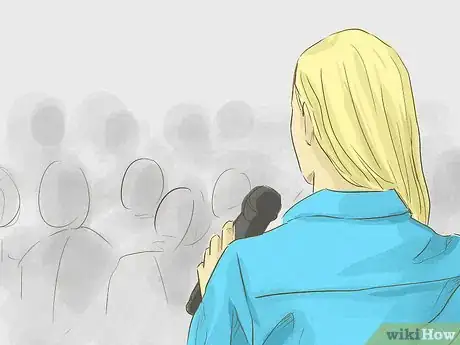

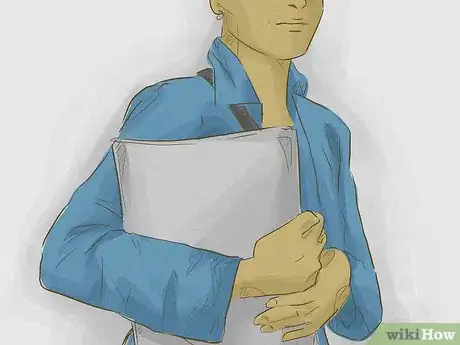
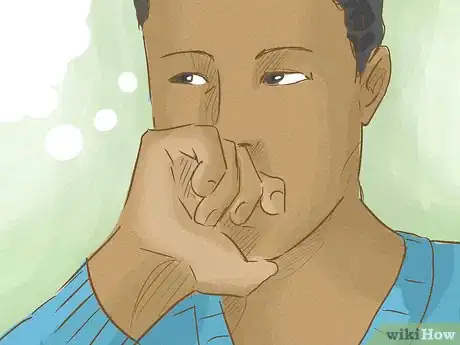

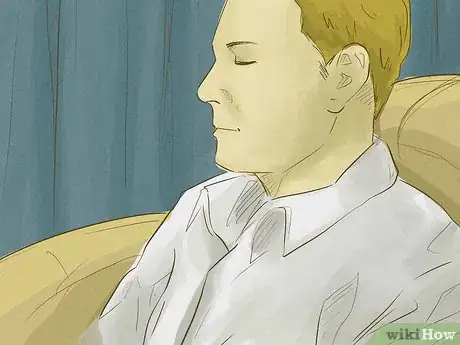


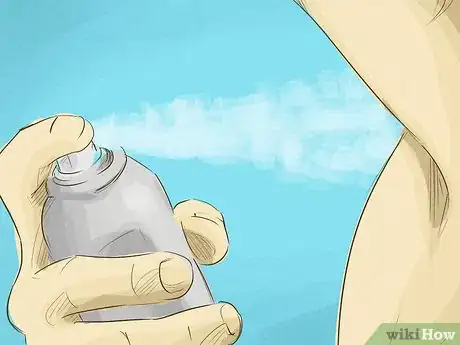

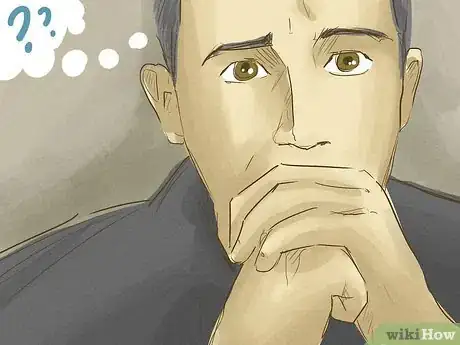

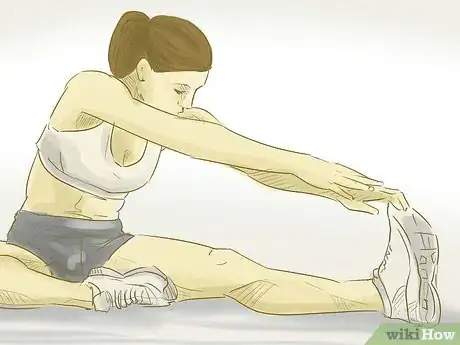
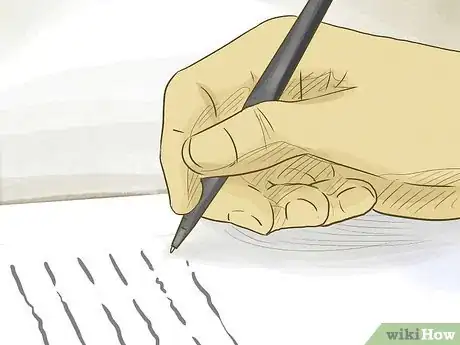

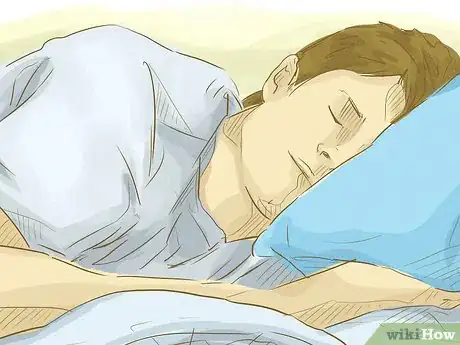



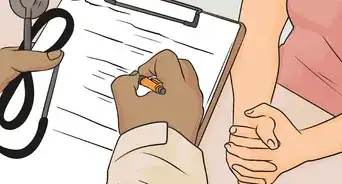























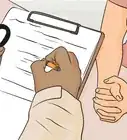






































Medical Disclaimer
The content of this article is not intended to be a substitute for professional medical advice, examination, diagnosis, or treatment. You should always contact your doctor or other qualified healthcare professional before starting, changing, or stopping any kind of health treatment.
Read More...